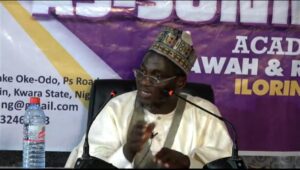Nikaah in Islam is an institution that Allah has established for Muslims to find solace, tranquility, love, mercy and reproduction of offsprings. All these embedded in Surah Ar-Rum, Chapter 30:21 of the Noble Qur’an. This undoubtedly has been in existence for long and based on principles and conditions that must be met.
Of the conditions include offer and acceptance, consent of the guardian of the female, payment of dowry to the wife, publicity of the union and others.
However, from this institution, a practice of remembering this date by couples has emanated. In doing this, they carry out different activities to mark the day they were pronounced husband and wife. This practice is widely known as ‘wedding anniversary’.
While some Muslims describe it as an alien practice to the Islamic faith, others opine that there is nothing wrong with recognising and marking the day with some activities.
Muslim News Nigeria in this special report spoke with renowned scholars for their views, to shed light on the practice.
The scholars, who expressed their views on the practice also listed conditions and criteria that should be met.
Some Conditions must be met – Prof. Alaro
A professor of Islamic law and Head, Department of Islamic Law, University of Ilorin, Dr. Abdurrazaq Alaro noted that the practice is haraam if it fails to meet certain conditions.

In an interview with Muslims News, the erudite Islamic scholar posited that the practice falls under the non-spiritual category and as such, the Islamic ruling on non-spiritual issues should be considered.
He said consideration of the conditions would distinguish Muslims from their non-Muslim counterpart, as taught by Prophet Muhammad (peace be upon him).
In his words, he said “Issues like this are better looked at as strictly non-spiritual practices. Usually, what we do as human beings generally and as subject to the Shari’ah of Almighty Allah, it is usually categorised into two: what we do as spiritual acts (‘ibadah) and other things we do as cultural or professional practices and so on. The rule guiding whatever is not strictly spiritual practices (‘ibadah) is the rule of whether it is halaal or haraam, and not whether it has something to support it as a Shari’ah textual authority.
“That one is what we look for when we talk about ‘ibadah because it must be done the same way Prophet Muhammad (peace be upon him) did it or taught us to do it. Having said this, we have to look at this anniversary from that angle, being a practice known in some environment and some cultures. We have to look at what makes a practice halaal or haraam.
“First is to find out where the particular practice is coming from or where it is being predominantly practised, because as a general rule, we are not allowed to pattern or structure our way of living in a way we would be copying what is known to be exclusively a practice of the non-muslims. In more than one hadith of Prophet Muhammad (peace be upon him), he categorically stated that as Muslims we need to preserve our identity. We have our own ways recommended for us by our religion in ways we do our things. We must not be seen blindly copying and emulating what followers of other religions are doing.
“So, if the anniversary is put to that test and it passes the test, then we can move to another condition, but that should be the first benchmark to be used, whether it is a practice emanating from a religion that has become known for them as their own practice. We are discouraged from following the pattern of lives of those who are not Muslims, particularly, if such practice has become an identity of followers of such religion.”
The Islamic law scholar said, “The second benchmark is to look at what is being done during this anniversary. As we have mentioned earlier, people have different ways of celebrating their wedding anniversary. Obviously, some of those things mentioned are purely haraam like throwing parties. We know what it is meant for people throwing parties in this part of the world, where we have so many prohibited acts going on in such parties.
“If that is the case, even if it is originally permitted, it will subsequently take the rule of non-permissibility because of what is being done there that is not permitted. But if it passes the first test of not being a dominant cultural practice as it is known in other non-Muslim climes, even that one does not make it an exclusive practice of followers of another religion. Then the second one like I said, we look at what is being done while that anniversary goes on in that particular place.”
He further advised couples to embrace the permissible practices during the act and shun prohibitions while seeing it as an avenue to reflect.
“If they can avoid what is haraam, then the rule of permissibility would take its cause and that is just the summary of what I want to say regarding this question.
“Finding it as an opportunity to reflect on the past, that one is clearly a halaal practice. If one is in doubt about an issue on whether it is halaal or haraam, you can approach a scholar for the ruling, but generally, if it is a cultural and non-spiritual practice, the ruling is to look for what is halaal and what is haraam.
“We have given two examples. One is clearly halaal and one is clearly haraam. Prophet Muhammad (peace be upon him) has guided us in everything. If you are in doubt of whether something is halaal or haraam, he advised you to avoid it as a precautionary measure. But even before so doing, you can seek intervention of somebody more knowledgeable than you to tell you.”, he emphasised.
It should not be encouraged – Dr. Bashir
A Northern Nigerian-based scholar, Chief Imam, Al-Furqan Central Mosque, Kano, Dr. Bashir Aliyu Umar opined that the practice should not be encouraged as it is a way of imitating the non-muslims.
Dr. Bashir posited that its encouragement would birth other baseless celebrations.
In his words, he said “This is a custom and not a religious activity. Customs are accepted in Islam so long as they do not go against the Qur’an and Sunnah. But that it is a custom of the non-Muslims, which has been integrated into part of their custom, for Muslims to copy them on that kind of anniversary would be going contrary to the teaching of Islam and Sunnah because it is imitating the non-Muslims.

“Therefore, it shouldn’t be done from this perspective, even though you can’t classify it as bid’ah, because bid’ah is suppose to be in acts of religion (spirituality). This is not an act of religion, but a customary practice. Even in customary practices, we are not supposed to be imitating non-muslims, because there is nothing peculiar about anniversary. There is no wisdom in celebrating it other than other people are doing it. For those doing it, it is part of their custom and they are not Muslims.
“So, when Muslims do it, they inadvertently leave their own identity in terms of their practice. Because if we continue that way – like wedding anniversary, birthday – we will soon join them in doing obituary and things like that. So, from that perspective, it shouldn’t be done.”, he expressed.
It should be seen as an avenue for reflection – Sheikh Sa’eed Salman
The Mudir, Madrasatu Sahwatul Islamiyyah, Iwaya, Lagos, Sheikh Sa’eed Salman stated that wedding anniversary should only be used as an avenue for couples to reflect and evaluate their union.
Sheikh Salman, who clarified the views on the issue opined that it cannot be generally categorised as halal or haram, as there is no scriptural backing for it.
According to him, he said “One thing we need to understand is that Islam is all encompassing. Islam talks about the spiritual and mundane life. But in Islam, before you can say anything is haram, there should be a scriptural backing for that assertion. So I want to start by saying that marriage is an institution that both husband and wife show themselves love and in Islam, Allah makes it clear that one of the impetus of marriage is love. Allah puts between husband and wife love and whatever that can increase that love is highly encouraged. Also, the Prophet made it clear that the best for two lovers is to get married to each other. From all these, we can see that love is of high paramount in the marriage institution.
“The question is are we allowed to celebrate this event tagged ‘wedding anniversary’?. Some scholars say if the Prophet did not do that, we don’t have to do that, saying it’s bid’ah. Some look at the angle from which the anniversary is coming to us because it is alien to us. Being alien to us does not mean we should categorically say it is halaal or haraam. Because if we are to conclude that we should go against everything that is not from us Muslims, we would be going against many of the tenets of Islam.

“Let me remind us an event that is monumental in Islamic history. There was a battle called Ghazwatul Khandaq (Battle of Trench). The trench was not common in the Arab world. It was Salman Al-Farsi who suggested it and Prophet Muhammad (peace be upon him) accepted it. Despite the fact that Salman was from Persia, and Persians in a way were pagans. The Prophet did not say because the trench was from them, he will not take it. No, he took it as an advice. So we can’t just conclude that wedding anniversary is from the western world. That should not be our stand.
“One thing I want us to understand is that we look at the content, and not the name. Nomenclature should not be our problem that since the coinage is not in the Islam, it’s bid’ah. No, that should not be our stand. When people celebrate this wedding anniversary, some will read Qur’an, remind themselves on things they need to work on in their marriage, some will throw parties for people, though that one is a minus. Some will go out, eat, dance and others.
He advised the observant of some Islamic measures.
“I want to say that if people can observe the following things, personally, I don’t see anything wrong in doing that. First is to ensure you have good intentions and not doing it for show-off, but for people to see what we are endowed with. So the intention matters.
“Secondly, it should be a time for reflection. There’s no marriage without itch. So, the husband and wife should sit and reflect. Are they learning in that situation? This is what should be considered.
“Also, they should not be extravagant. If they want to throw a party and give food to people, they still should not be extravagant. Additionally, while giving food to people, it should take the form of thanksgiving and charity. They should not be selective by only providing food for the rich or their billionaire friends while ignoring the poor. It’s not part of Islamic principles.”
The Senior Assistant Registrar, Yaba College of Technology emphasised that it is not a festival in Islam and doing it should not deter one from carrying out primary acts of worship.
“Equally, we should establish the fact that it’s not another festival in Islam. It’s not ‘Eid. Allah said in the Qur’an that ‘Remind them with the days of Allah’. The day you got married is one of the days and the day you are celebrating the anniversary is another day of high paramount in your life.
“The last thing I think we should take note is that we shouldn’t let the celebration override other important activities in our lives. Because you are doing your wedding anniversary, you shouldn’t abandon Solaah, or engage in what is bad like taking alcohol and others.
“So, this is my humble view on the issue of wedding anniversary. You can’t say categorically that it is haraam since there’s no clear cut evidence from the Qur’an on such and I don’t think any of our scholars have declared it haraam. The only challenge some will say is that since it is alien to our Islamic culture, why are we celebrating it? That is not enough as evidence to say it is not allowed. WAllahu A’lam”, he concluded.
Wedding anniversary not haraam if… – Lekki Chief Imam
The Chief Imam of Lekki Central Mosque, Sheikh Ridwan Jamiu upholds that the practice of wedding anniversary is not haraam if it does not contradict Islamic standards and good deeds are performed therein.

Sheikh Ridwan advised rewarding deeds such as reflection, giving charity, cementing family ties, praying for each other are done and devoid of extravagance.
“Matters like this do not fall within the scope of acts of worship. Bidia’ may not be there except whoever has attributed religious status to it. It’s a worldly (mundane) thing. Also, it’s not something common among those who came before us. It has to do with culture and the evolving society. People can always bring things that would better their lives generally, even though it was not done in the past. As long as the person does not violate any of the principles of Islam.
“So, on this particular one, we have to look at the advantages and disadvantages. If the advantages are beneficial like cementing family ties, especially now that families are collapsing. Sometimes, couples want to rejoice with each other and remember how they have been living, it’s a sign they have been living happily. They may even want to do things that make their living convenient. We won’t say this one is not okay.
“But anything you want to do, even if it’s a worldly thing, should not contradict any Islamic principle, like if one wants to be fasting on that day, it won’t be allowed because it’s not written in the Shari’ah that one fasts on such a day, even if our intent is to show appreciation to Allah, one can do that in so many other ways.”
On how it should be done, Sheikh Ridwan opined “One can give charity, it’s okay. But putting up a waleemah for that, we won’t say that is haraam, but disliked because if people follow up on this, it would lead to extravagance because of excessive spending, which is not allowed in the Shari’ah. We do not encourage anyone to put up a party for this purpose. The money you have belongs to Allah and you can only spend it as He has instructed us to do on things that are permissible and not Haraam. Extravagance is something that is Haraam and should be avoided.
“Same thing like putting up a special prayer, like a ceremonial one, that may not be advisable. If the couple want to thank Allah, they should sit together to do that, think about their marriage, appreciate each other, share things, pray for each other. A thing like this is a family matter and is laudable. When it begins to involve outsiders and others following that step, you won’t be able to regulate it anymore”.
By: Rasheed Abubakar and Abdul Waheed Shotonwa




I will like to relate birth anniversary with what professor Alaro said, birth anniversary is not a spiritual activity but can we say it is from Non Muslims?? Or what exactly makes it haram as most people claimed. Why can’t we use this same explanation for it? I would be glad if my question is answered jazakumullahu khayran.
How many wedding anniversary will be celebrated by a man who married four 4 wife can we imagine what usually happens when undertaking walimatul Nikah a lot of miss appropriation and error committed now we are to include marriage Anniversary let us be wary and fear Allah